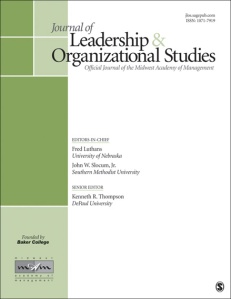Are Authentic Leadership and Fairness Connected?
 [We’re pleased to welcome Christa Kiersch of University of Wisconsin–La Crosse. Dr. Kiersch recently collaborated with Zinta S. Byrne of Colorado State University on their article from Journal of Leadership and Organizational Studies entitled “Is Being Authentic Being Fair? Multilevel Examination of Authentic Leadership, Justice, and Employee Outcomes.”]
[We’re pleased to welcome Christa Kiersch of University of Wisconsin–La Crosse. Dr. Kiersch recently collaborated with Zinta S. Byrne of Colorado State University on their article from Journal of Leadership and Organizational Studies entitled “Is Being Authentic Being Fair? Multilevel Examination of Authentic Leadership, Justice, and Employee Outcomes.”]
Like many interested in leadership and organizational science, I often ask myself (and my perhaps less interested undergraduate students) what it means to be a great leader or to have great leadership. This seems to be a guiding question of much of the research in organizational leadership, and with good cause. If we can better understand what great leadership is, then we may be able to get more of it through improved selection assessments or training and development programs. To go one step further, if we can better understand why certain leadership skills or behaviors or other characteristics are effective, we can offer more precisely targeted recommendations for leaders hoping to make a positive impact (and be more specific regarding what the positive impact will be). This captures the underlying goal of this study, to inform actionable strategies for leaders to positively influence the people and goals of their organization or team.
In our research, we found that being an authentic leader (one based on honesty, self-awareness and transparency) often means being a fair leader, and that one way in which authentic leadership has a positive impact on team members and team outcomes is via perceptions of fair treatment among the team. While I had a hunch that this core relationship between authentic leadership and fairness would be supported in the study, I was intrigued by the complexities of our multi-level findings. I find it interesting that authentic leadership impacts individual perceptions and shared group perceptions (i.e., team climate) a bit differently, and that this impact also appears different depending on the outcome of interest (e.g., turnover intentions vs. employee well-being). I sincerely look forward to continued dialogue regarding these findings and more generally regarding the interesting ways in which leadership impacts (and is impacted by) individuals and groups.
You can read “Is Being Authentic Being Fair? Multilevel Examination of Authentic Leadership, Justice, and Employee Outcomes” from Journal of Leadership and Organizational Studies for free by clicking here. Want to know about all the latest research from Journal of Leadership and Organizational Studies? Click here to sign up for e-alerts!
 Christa E. Kiersch is an assistant professor of Management at the University of Wisconsin – La Crosse. Her research interests include leadership, organizational justice, and social responsibility in the workplace.
Christa E. Kiersch is an assistant professor of Management at the University of Wisconsin – La Crosse. Her research interests include leadership, organizational justice, and social responsibility in the workplace.
Zinta S. Byrne is a professor of Industrial and Organizational Psychology at Colorado State University. Her current research interests focus on employee engagement, organizational justice, and computer-mediated exchanges.

































































































